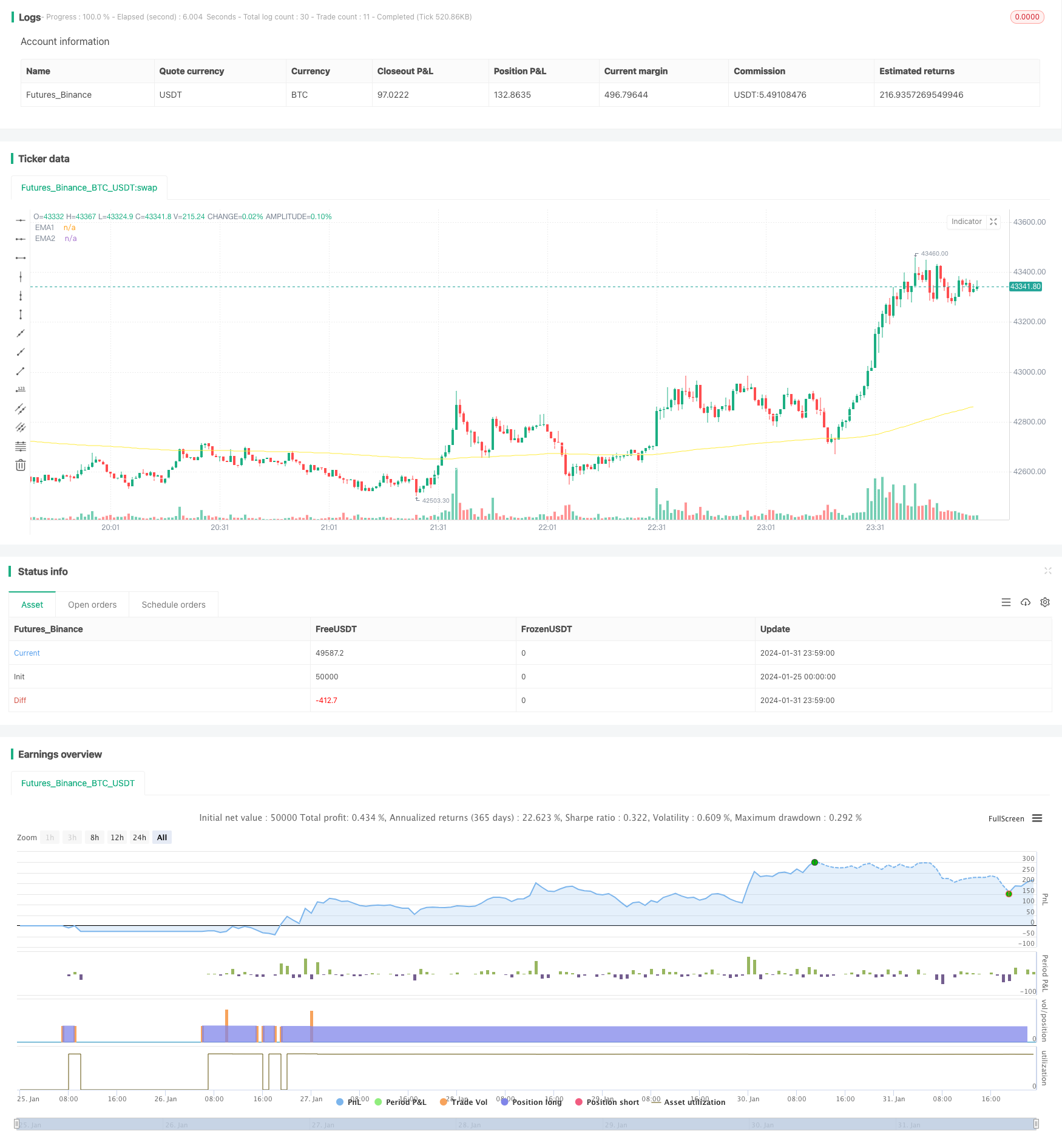
概述
本策略基于EMA均线和RSI指标的隐藏背离信号开启多头仓位,通过识别隐藏多头背离形成的特征点,判断当前处于上升趋势的开始,作为开仓信号。同时,结合EMA均线的黄金交叉以及K线收盘价格位于EMA均线之上,可确保趋势向上。此策略适合追踪中长线趋势,在盘整结束后的重新上涨阶段打开多头仓位。
策略原理
EMA均线策略:利用50周期与250周期EMA均线进行黄金交叉判断趋势,价格上穿50EMA时视为多头信号。
RSI隐藏背离策略:RSI指标出现较低低点,而价格出现较高低点的隐藏多头背离信号,预示着反转的开始。配合限定背离点数量,可过滤假信号。
K线收盘策略:K线收盘价格超过50EMA时开仓做多。
综合以上三个策略判断当前为趋势开始上涨点,开启做多仓位。
优势分析
使用EMA均线判断趋势方向,配合RSI指标的反转信号,可在趋势开始阶段打开仓位。
双重确认机制,利用EMA、RSI和K线收盘价格的组合判断,可有效过滤假信号。
追踪中长线趋势,适合在盘整后判断新的上涨趋势开始。
风险分析
EMA均线产生死叉时,需要及时平仓。
RSI隐藏背离信号判断需要一定的经验,参数设置不当可能错过信号或判断错误。
对交易品种的参数需要优化设置。
优化方向
动态调整EMA均线的参数,优化判断趋势的精准度。
调整RSI参数,优化判断隐藏背离的准确性。
加入止损机制,利用ATR止损或百分比止损等方式控制风险。
开发空头交易策略,使策略可在下跌趋势中打开空头做空仓位。
总结
本策略综合运用EMA均线判断大趋势,配合RSI指标增加判断准确性,在盘整结束后判断新的上涨趋势开始,属于较为保守的趋势追踪策略。通过优化参数设置以及加入止损手段,能够获得较好的效果。与简单的移动平均线策略相比,判断上涨趋势的准确性更高,胜率会较高,属于实用型策略。
策略源码
/*backtest
start: 2024-01-25 00:00:00
end: 2024-02-01 00:00:00
period: 1m
basePeriod: 1m
exchanges: [{"eid":"Futures_Binance","currency":"BTC_USDT"}]
*/
//@version=4
strategy(title="EMA RSI ATR Hidden Div Strat", shorttitle="Hidden Div Strat", overlay = true, pyramiding = 0, max_bars_back=3000, calc_on_order_fills = false, commission_type = strategy.commission.percent, commission_value = 0, default_qty_type = strategy.percent_of_equity, default_qty_value = 10, initial_capital=5000, currency=currency.USD)
// Time Range
FromMonth=input(defval=1,title="FromMonth",minval=1,maxval=12)
FromDay=input(defval=1,title="FromDay",minval=1,maxval=31)
FromYear=input(defval=2020,title="FromYear",minval=2016)
ToMonth=input(defval=1,title="ToMonth",minval=1,maxval=12)
ToDay=input(defval=1,title="ToDay",minval=1,maxval=31)
ToYear=input(defval=9999,title="ToYear",minval=2017)
start=timestamp(FromYear,FromMonth,FromDay,00,00)
finish=timestamp(ToYear,ToMonth,ToDay,23,59)
window()=>true
// Bar's time happened on/after start date?
afterStartDate = time >= start and time<=finish?true:false
//EMA'S
emasrc = close
len1 = input(50, minval=1, title="EMA1")
ema1 = ema(emasrc, len1)
col1 = color.white
len2 = input(250, minval=1, title="EMA2")
ema2 = ema(emasrc, len2)
col2 = color.yellow
//Plots
plot(ema1, title="EMA1", linewidth=1, color=col1)
plot(ema2, title="EMA2", linewidth=1, color=col2)
//Stoch
periodK = input(4, title="K", minval=1)
periodD = input(4, title="D", minval=1)
smoothK = input(3, title="Smooth", minval=1)
k = sma(stoch(close, high, low, periodK), smoothK)
d = sma(k, periodD)
//Hidden Divergence Indikator
len = input(title="RSI Period", minval=1, defval=14)
src = input(title="RSI Source", defval=close)
lbR = input(title="Pivot Lookback Right", defval=1)
lbL = input(title="Pivot Lookback Left", defval=19)
rangeUpper = input(title="Max of Lookback Range", defval=20)
rangeLower = input(title="Min of Lookback Range", defval=4)
hiddenBullColor = color.new(color.green, 80)
textColor = color.white
noneColor = color.new(color.white, 100)
osc = rsi(src, len)
plFound = na(pivotlow(osc, lbL, lbR)) ? false : true
phFound = na(pivothigh(osc, lbL, lbR)) ? false : true
_inRange(cond) =>
bars = barssince(cond == true)
rangeLower <= bars and bars <= rangeUpper
//------------------------------------------------------------------------------
// Hidden Bullish
// Osc: Lower Low
oscLL = osc[lbR] < valuewhen(plFound, osc[lbR], 1) and _inRange(plFound[1])
// Price: Higher Low
priceHL = low[lbR] > valuewhen(plFound, low[lbR], 1)
hiddenBullCond = priceHL and oscLL and plFound
//buy Conditions
buyhiddenbull = hiddenBullCond[1] or hiddenBullCond[2] or hiddenBullCond[3] or hiddenBullCond[4] or hiddenBullCond[5] or hiddenBullCond[6] or hiddenBullCond[7] or hiddenBullCond[8] or hiddenBullCond[9] or hiddenBullCond[10]
emacondition = ema1 > ema2
upcondition = close[1] > ema1[1] and ema2[1] and close[2] > ema1[2] and ema2[2] and close[3] > ema1[3] and ema2[3]
crossup = k[0] >= d[0] and k[1] <= d[1]
longcondition = emacondition and upcondition and crossup and buyhiddenbull
if (afterStartDate)
strategy.entry("Long", strategy.long, when = longcondition)
//TakeProfit, StopLoss lowest low
profitfactor = input(title="Profitfactor", type=input.float, step=0.1, defval=1.6)
loLen = input(title="Lowest Low Lookback", type=input.integer,
defval=38, minval=2)
stop_level = lowest(low, loLen)[1]
bought = strategy.position_size[1] < strategy.position_size
barsbought = barssince(bought)
if strategy.position_size>0
profit_level = strategy.position_avg_price + ((strategy.position_avg_price - stop_level[barsbought])*profitfactor)
strategy.exit(id="TP/ SL", stop=stop_level[barsbought], limit=profit_level)